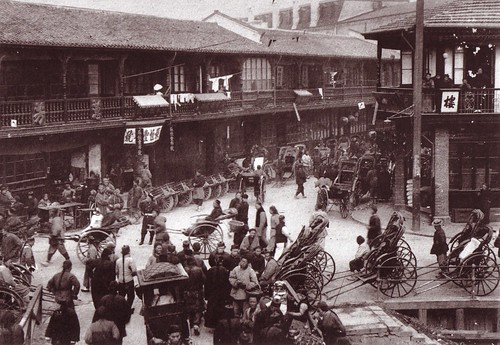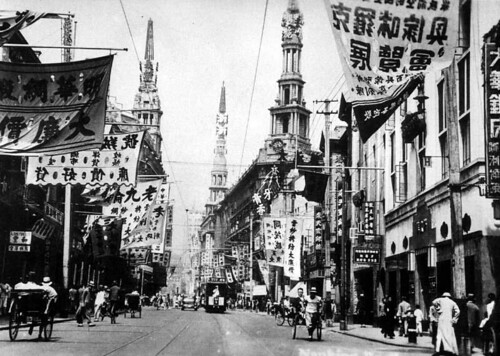
The Old Chinese City in Shanghai
1. We have a saying that "sticks and stones may break my bones, but words can never hurt me." Yet Pearl felt very hurt by her father's words, near the beginning of the book. When have you experienced something similar?
"This is another of my father's standard criticisms and one he picked up from Confucius, who wrote, 'An educated woman is a worthless woman.' People calle me bookish, which even in 1937 is not considered a good thing. But as smart as I am, I don't know how to protect myself from my father's words" (pp. 3-4).2. The novel begins with Pearl saying, “I am not a person of importance” (p. 3). After Yen-yen dies, Pearl comments: “Her funeral is small. After all, she was not a person of importance, rather just a wife and mother” (p. 246). How do you react to comments like these?
3. These quotes from the first chapter show us a major cultural difference for most westerners today. Try to imagine how you would feel if your father said this to you, and then the man you had a crush on (Z. G.) backs up what your father said.
Their father: "I've arranged marriages for the two of you ... The ceremony will take place day after tomorrow" (p. 19).
Pearl: "I'm to be sold -- traded like so many girls before me -- to help my family. I feel so trapped and so helpless that I can hardly breathe" (p. 26).
Pearl: "In the end, Z. G. says the one thing I didn't expect. 'You should marry the man. He sounds like a good match, and you have a duty to your father. When a girl, obey your father; when a wife, obey your husband; when a widow, obey your son. We all know this is true" (p. 30).

Shanghai's Nanjing Road in the 1930s



5 comments:
I have posted some discussion questions about Shanghai Girls.
The photos were a neat touch. Thanks for adding them.
I didn't make it to one fourth of the book, but will respond to some of the questions.
1. Changing the saying to "Sticks and stones may break my bones, but words can break my heart" is closer to reality than the traditional saying.
Fortunately, my parents weren't ones to say hurtful things, but I remember very well hateful things said by peers as I was growing up.
2. When I was a stay at home Mom similar comments of being just a Mom were irritating. I remember one year after teaching Bible school that there was an article in the church newsletter about the session thanking the teachers especially the ones who took vacation time to teach (we've since gone to evening Bible school)
as if the working mothers who taught gave more than the non-working ones even though they were getting paid to teach since non-working mothers didn't get any vacation leave. That was the last year I taught Bible school.
3. If the father had recited this familiar saying of the obedience expected of women, it would have been less surprising than Z.G.'s conformity of this cultural belief. Coming from him, it made me wonder about his sexual persuasion. Pearl was amazingly independent and forward thinking for the time and culture. These comments would have discouraged most women from being independent thinkers, but Pearl seemed strong enough that she retained her sense of identity in spite of them.
One of the things that I observed was although the culture outwardly valued subservient women, Pearl and May's mother was actually very strong. She'd kept some of the dowry money for herself - as her own mother had admonished her to do - and took her daughters away from Shanghai on her own, despite the difficulties of traveling with bound feet. Her emotional and physical strength was also evident in the scene where the Japanese soldiers repeatedly rape her - and she only wants to protect her daughters.
I was also quite impressed with the hidden strength of the mother. Although she probably was aware of the gradual loss of their possessions which enabled her to begin considering and preparing options, it was surprising how she quickly moved from her subservient role to one of great strength.
It was also insightful that her way of sharing values was through stories.
I hadn't thought of the value of the mother's stories, Shirley. But you are right: women telling their stories to other women really is a source of strength and power to them all.
Post a Comment